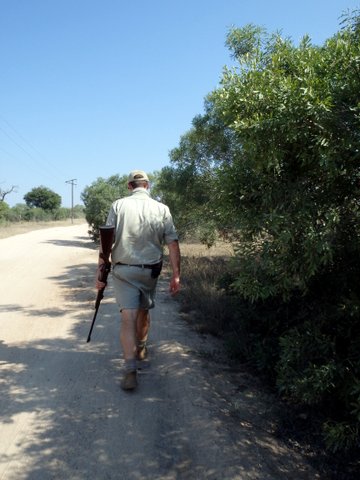
I am sitting looking up at the Black Mountains, around 300 miles east of Cape Town, the end result of a long day of driving on what is called the “Garden Route.” That’s kind of a misnomer, so far anyway, since I’ve not seen any “Gardens.” Instead, it’s been through rugged country that is greener than, but reminiscent of, the wild west. It’s dry (the rains come mostly in the spring), otherwise we might have been in Thompson Canyon, on our way to Rocky Mountain national park.
Again, many of the plants were different (I saw aloe), but some were the same (they grow sweet corn), and a few different animals. Just as we left rush hour Cape Town (at 7 am), we passed a sign warning us to keep an eye peeled for baboons. I had no idea baboons live on the plains, but we spotted many of them even without warning signs in some of the valleys along the way. They skittered away as soon as we stopped to try to take pictures, probably having read the signs, “look out for people.”
We did stop at a “farm store” along the way, where the signs were bilingual–English and Afrikaan, which are the two most common of the 11 official languages. I remember collecting stamps from the Union of South Africa in pairs, one of which was in English, the other in Afrikaan, a mark of the troubled history of the country, which was wrought by tribal wars, and at least two major wars between the British and the descendant of the Dutch settlers, the so-called Boers. As some of you Scouts may recall, Baden Powell’s inspiration for the Boy Scouts was the unpreparedness of the British to fight the Boers. Afrikaan is based on the Dutch language–we’re at the Swartberg Country inn, which is “Black Mountain”.
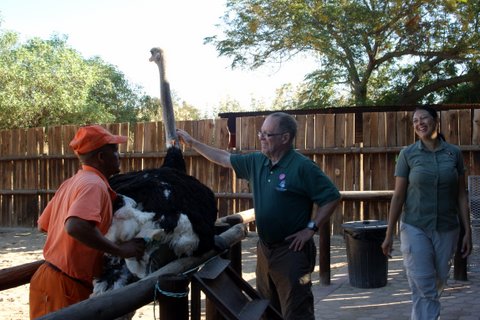
There was no mistaking a sign that said, “Lock your cars, use remote control,” whatever that meant. It’s a reminder of the high
unemployment and high crime that is one of the current problems that plague this potentially rich country. I heard from a former student that his company cancelled a trip here because of “urban unrest.” An anti-foreign protest (workers from elsewhere in Africa come here for better jobs and better pay, and I saw that an automobile parts company here had relocated to Lesotho–one of two countries embedded in South Africa–because of cheaper labor) rerouted a planned tour of Durban for my Australian friends.
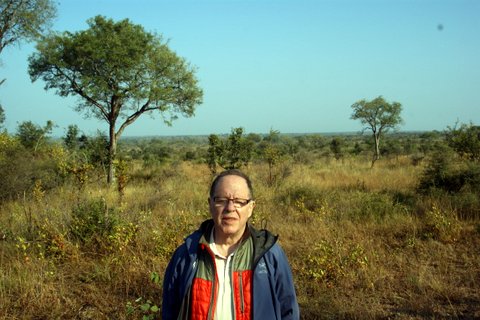
The other different animals we saw were ostriches, farmed here for meat and leather, and one of the objects of our visit to this part of South Africa. We went to an ostrich farm, which in addition to raising over 300 of the birds, charges about $10 for a tour. The heyday of the industry in many ways was pre-1914 when women wore ostrich feathers in their hats (the museum had some stunning examples), creating “feather barons” who built mansions in the major town nearby–Oudtschoon. Today, it’s mostly leather and meat, though the plumage makes great feather dusters (so good the guide told us that automakers use them to dust the car before painting), and one can buy other products in the gift store at the ranch.
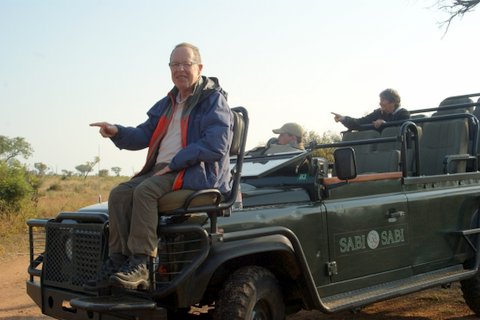
Of course, the region dictated lunch and dinner–ostrich. The filet last night was much tastier than the ostrich salad we had yesterday for lunch. The herd gets culled (maybe I should say killed) at 14 months, when ostrich are at their tenderest. Some stick around for breeding (the 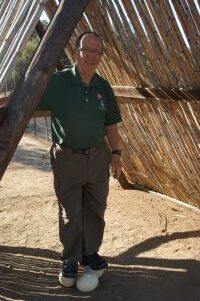 ladies lay between 11 and 20 eggs at a time), and a few others to be part of the show–which includes a jockey race and the opportunity to have your picture taken with them.
ladies lay between 11 and 20 eggs at a time), and a few others to be part of the show–which includes a jockey race and the opportunity to have your picture taken with them.
I doubt we’ll have ostrich egg for breakfast, though; the egg replaces 24 chicken eggs, and are virtually unbreakable. You can stand on them, as I’m doing in the picture.
I wonder what the word for today (it’s Wednesday here already) will be?